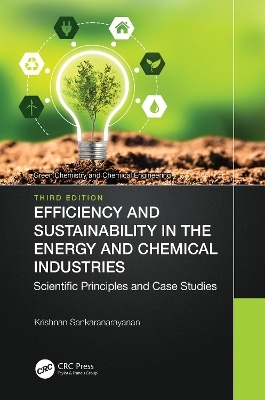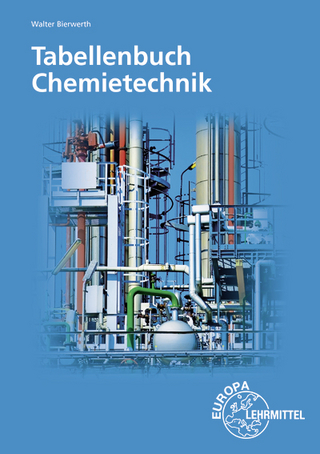
Efficiency and Sustainability in the Energy and Chemical Industries
CRC Press (Verlag)
978-1-032-30298-0 (ISBN)
Using classic thermodynamic principles as the point of departure, this new edition of a popular resource supplies the understanding and tools required to measure process ef ciency and sustainability with much improved accuracy. Exploring the driving forces in the chemical and power industries, Efficiency and Sustainability in the Energy and Chemical Industries: Scientific Principles and Case Studies, Third Edition investigates why losses occur and explains how to reduce them. It focuses on the changing roles of refining and chemicals in industry and how the industry is transforming itself, and considers economics as a key enabler to look at technology choices and whether shareholder returns will be there.
Includes new chapters on plastics recycling technologies and challenges, low carbon energy sources, the changing energy mix, and project economics, taxes, and subsidies
Illustrates techniques with wide-ranging case studies related to energy conversion, mining, and the chemical industries as well as examples and problems
Considers engineering layouts that reduce the environmental impact of chemical operations
Explains how to use energy analysis to accurately assess the quality and performance of chemical processes
Supplies quantitative tools for analyzing sustainability and efficiency
Investigates the challenges of the hydrogen economy and CO2 and low carbon
Discusses plastics recycling, economics, and a changing energy mix
Complete with the keys to quantification of process efficiency and sustainability, this cutting-edge book is the ideal guide for those engaged in the transition from fossil-based fuels to renewable and sustainable energy sources using low-waste procedures.
Krishnan Sankaranarayanan received his MSc at Delft University of Technology, the Netherlands and his PhD at Princeton University, New Jersey. At Delft, he did an extensive study of the energy efficiency of the polyolefin industry, for which activity DSM acted as host. After 12 years at ExxonMobil he joined SABIC where he worked on a variety of technology developments, circular economy, and energy transition. He is currently leading Digital Transformation for the technology organization and is based in Houston, Texas.
PART I Basics
Chapter 1 Introduction
Chapter 2 Thermodynamics Revisited
Chapter 3 Energy “Consumption” and Lost Work
Chapter 4 Entropy Generation: Cause and Effect
Chapter 5 Reduction of Lost Work
PART II Thermodynamic Analysis of Processes
Chapter 6 Exergy, a Convenient Concept
Chapter 7 Chemical Exergy
Chapter 8 Simple Applications
PART III Case Studies
Chapter 9 Energy Conversion
Chapter 10 Separations
Chapter 11 Chemical Conversion
Chapter 12 A Note on Life Cycle Analysis
PART IV Sustainability
Chapter 13 Sustainable Development
Chapter 14 Efciency and Sustainability in the Chemical Process Industry
Chapter 15 Plastics Recycling
Chapter 16 Project Economics, Taxes, and Subsidies for Sustainability
Chapter 17 Low Carbon
Chapter 18 A Changing Energy Mix
Chapter 19 CO 2 Capture and Sequestration
Chapter 20 Sense and Nonsense of Green Chemistry and Biofuels
Chapter 21 Solar Energy Conversion
Chapter 22 Hydrogen: Fuel of the Future?
Chapter 23 Future Trends
| Erscheinungsdatum | 07.09.2023 |
|---|---|
| Reihe/Serie | Green Chemistry and Chemical Engineering |
| Zusatzinfo | 149 Line drawings, black and white; 24 Halftones, black and white; 173 Illustrations, black and white |
| Verlagsort | London |
| Sprache | englisch |
| Maße | 156 x 234 mm |
| Gewicht | 848 g |
| Themenwelt | Naturwissenschaften ► Chemie ► Technische Chemie |
| Naturwissenschaften ► Physik / Astronomie | |
| Technik ► Umwelttechnik / Biotechnologie | |
| ISBN-10 | 1-032-30298-4 / 1032302984 |
| ISBN-13 | 978-1-032-30298-0 / 9781032302980 |
| Zustand | Neuware |
| Informationen gemäß Produktsicherheitsverordnung (GPSR) | |
| Haben Sie eine Frage zum Produkt? |
aus dem Bereich


